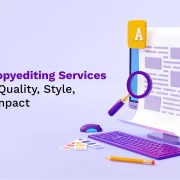
Best Practices in Editorial Project Management for Publishers
Summary
This article provides an overview of editorial project management, describing the tasks involved, who performs them, the benefits of project management plans, and best practices to ensure quality publishing outcomes.
Editorial project management essentially means controlling and curating how the book turns out after publishing. It involves various tasks that decide the quality of the publishing process. Effective editorial project management can transform your disorganized work into a well-structured process that will ensure quality results.
Let’s know why this is important in this blog.
Table of Contents:
- What is Editorial Project Management?
- Editorial Project Management Tasks
- Who Performs the Editorial Project Management Tasks?
- Benefits of Editorial Project Management Plan
- Best Practices in Editorial Project Management
- Conclusion
What is Editorial Project Management?
In the world of publishing, editorial project management refers to overseeing all the processes and functions involved in transitioning a manuscript into a printed/electronic version for consumption of the end-readers.
In simple terms, editorial project management means overseeing and organizing all the different parts of a publishing or editorial project to make sure it gets done successfully. This includes managing the tasks, people, time, and resources needed to create and produce written content like books, magazines, websites, or other publications.
Editorial Project Management Tasks
The tasks involved in editorial project management can be broadly categorized into 3 tasks.
1. Coordinating with Authors & Other Stakeholders
- Coordinating all activities and holding regular team meetings for brainstorming and negotiating any problems that may arise
- Checking for permissions and ensuring there is no violation of copyright material or intellectual property
- Updating the stakeholders on the progress of the project and estimated time of completion
2. Coordinating with Freelancers & Suppliers
- Providing detailed briefs about all tasks and ensuring that they are carried out efficiently
- Ensuring that the manuscript is edited, type-set, proofread, illustrated, indexed, and converted to a print/digital version
- Providing necessary feedback
- Approving budgets and overseeing all other financial arrangements
3. Taking Ownership of the Project
- Sourcing missing content checking artwork and getting approvals from the authors
- Ensuring that the project progresses within the budget and timeframe, and is delivered to the highest standards
- Maintaining a project sheet to ensure consistent standards throughout the project
- Maintaining the quality of the project – right from inception to the final deliverables
Also Read: Publishing Services: End-to-End Services for Journal Publishers
Who Performs the Editorial Project Management Tasks?
1. In-house and External Project Managers
Traditionally, editorial project management was mainly done in-house, but given the complexities of the tasks involved, many companies are now outsourcing the entire project management or keeping certain aspects, for example, design and creating type specifications, in-house, and hiring external project managers to manage other tasks such as editing, proofreading, indexing and formatting.
2. Packagers
This is generally a typesetting company that is hired to manage a large number of titles for publishers. In a normal workflow, packagers are provided an initial brief and after that, they work independently of the sourcing company.
3. Copy Editors
Many companies prefer to outsource their copy-editing and proofreading requirements. In fact, a freelance project manager could also be the copy editor, proofreader, or typesetter of the project.
Benefits of Editorial Project Management Plan
Laying out a detailed editorial strategy is of utmost importance in editorial project management. A majority of organizations struggle with their editorial project management plans. When done right, an editorial project management plan can help you build a path for positive business outcomes.
- Helps your entire team be on the same page working towards a unified goal
- Helps you prioritize the tasks that matter
- Helps you track your progress
- Helps you analyze the areas of improvement and opportunities
- Helps you be in control of the editorial process
Managing a project efficiently requires a lot of experience, skills, knowledge, and excellent organizational skills. When you hire editorial project managers, they will bring their own workflows to the table. It is important to ensure that best practices of editorial project management are followed.
Best Practices in Editorial Project Management
- Understand the Project: Define the goals, objectives, and requirements. Determine the resources you will need to take it to its logical conclusion and also assess the risks and lay out strategies to tackle them.
- Examine the Content: You may also take into confidence your copy editor to assess the structure and use of language in the manuscript. Also, consider the format and digital blend, and review the multimedia and features required to create a digital version.
- Scheduling: Prepare an efficient time-bound schedule to ensure timely completion of each task in the project.
- Budgeting: Determine the costs and assess the profitability of the project. Also, create a contingency plan while keeping within the budget.
- Manage the Team: Depending on the work requirements, match capabilities and put together an effective team to give shape to the project. Create detailed briefs to share with each member of the team. You may also need to work with freelancers.
- Hold an Initial Project Kick-Off Meeting: The meeting will help align all the stakeholders to the goals of the editorial project. Communicate with all members their roles and the tasks they have to perform. Share with them the briefs you have prepared so they are clear about their roles and duties.
- Create a Work Definition Document: Clearly explain and document the scope and objectives of the project and the responsibility for each task. Also, define the procedures upfront so the team members know what to expect and what is expected of them.
- Create a Workflow and Plan: This is another crucial factor for successful editorial project management as it ensures that work is carried out within the time and budget. This document serves as a reference guide for all team members to accomplish their tasks.
- Document Real-time Data: Everything needs to be accounted for and the best way to do this is to document everything. In case anything happens, it becomes easier to trace the source of the problem and fix it. Also, with everything documented, you will have all the data you need for actionable insights and better decision-making.
- Communicate Effectively: Schedule regular meetings to ensure that the editorial project is on track and all members are meeting their milestones. Effective communication will help you anticipate problems and avoid any delay in project delivery due to misunderstandings.
- Track Progress: Continuous tracking is essential in editorial project management. Monitor the progress and performance of each member. Ask for progress reports and record differences, if any, between actual and planned schedule, scope, and cost. Be flexible and adjust the plan should the need arise.
- Read and Respond to Warning Signs: Keep a look out for any warning signs that could cause a variance in the schedule and delivery or compromise the quality of deliverables.
- Manage the Scope of the Project: In case of any change in scope, ensure that it is approved by the project sponsor as it will directly impact the schedule and budget. Additional tasks can extend the deadline and also add to the cost of the project.
- Resolve All Issues Immediately: Small issues can get out of control if they are not addressed immediately. Attend to all issues at the onset to ensure that the editorial project proceeds smoothly.
Also Read: 3 Types of Copy Editing that Make it a Core Editorial Service
In Conclusion
Having a proactive approach to editorial project management will help in the decision-making, planning, and execution of the project. It is important to be prepared for any problems that might arise and make adjustments along the way. Having a contingency plan in place is a good way to be ready for unprecedented problems.
As with other project management disciplines, editorial project management is all about effective listening and communication. Start slowly and test the waters as you go with an expert like Hurix Digital. Learn from your experiences, document everything, and use the data for better decision-making and creating best practices in editorial project management specific to your company.
Get in touch with us today!

Vice President – Content Transformation at HurixDigital, based in Chennai. With nearly 20 years in digital content, he leads large-scale transformation and accessibility initiatives. A frequent presenter (e.g., London Book Fair 2025), Gokulnath drives AI-powered publishing solutions and inclusive content strategies for global clients





